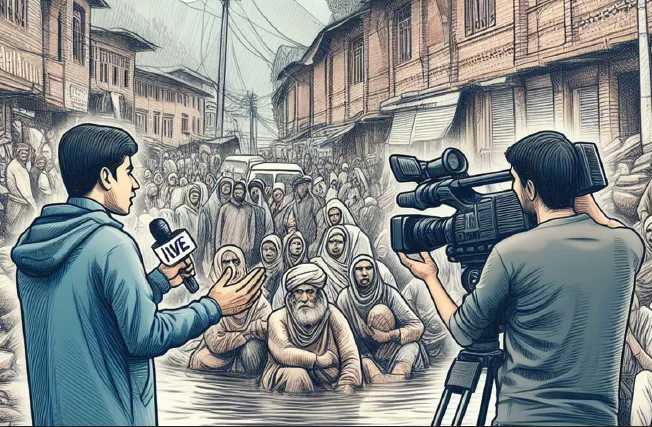In the realm of journalism, few pursuits are as noble and necessary as shining a light on the suffering of marginalized communities. Reporters, armed with pens and cameras, traverse landscapes scarred by conflict, poverty, and injustice, seeking to amplify voices that would otherwise remain unheard.
Their efforts often garner recognition, with prestigious awards serving as tokens of validation for their dedication to truth-telling. Yet, in the backdrop of accolades and acclaim, lies a complex moral quandary that demands introspection: can the recognition of reporters who chronicle the suffering of others be truly justified when the victims themselves continue to languish without justice or relief?
The conflict in Kashmir stands as a stark example of this ethical dilemma. Countless journalists, drawn by the allure of capturing the tumultuous reality of life in the region, have ventured into its heart, documenting stories of loss, resilience, and despair. Their narratives have stirred hearts and minds, prompting international recognition and accolades. However, amidst the glow of success, the suffering of the Kashmiri people persists, largely unabated by the spotlight cast upon their plight.
The question then arises: is it morally justifiable for reporters to receive accolades while the subjects of their reporting remain ensnared in a cycle of oppression and violence? The answer is not a straightforward one.
On one hand, the recognition bestowed upon journalists acknowledges the vital role they play in shaping public discourse and holding power to account. It serves as a testament to their courage and dedication in confronting uncomfortable truths, often at great personal risk. Awards can also elevate the visibility of an issue, mobilizing public support and catalyzing action for change.
However, the celebration of journalistic achievement must be tempered with a sobering recognition of the broader implications of the reporting process. In their quest for compelling stories, journalists walk a fine line between shedding light on injustice and potentially exacerbating the very suffering they seek to expose.
The act of bearing witness to trauma can retraumatize those who have already endured unimaginable hardship, raising ethical concerns about the boundaries of journalistic intrusion and exploitation.
Moreover, the disparity between the accolades bestowed upon reporters and the tangible impact on the lives of the affected communities underscores the inherent power dynamics at play. While journalists may receive recognition and acclaim, the true measure of their success lies not in awards, but in the extent to which their reporting facilitates meaningful change and redress for those whose voices they amplify.
In grappling with this moral conundrum, journalists must remain vigilant in their ethical obligations to the subjects of their reporting. This entails not only a commitment to accuracy and fairness but also a deep-seated empathy and responsibility towards those whose stories they tell. It requires introspection and humility, acknowledging the inherent limitations of outsider perspectives and striving to center the voices and agency of the marginalized.
Furthermore, the ethical imperative extends beyond the act of reporting itself to encompass broader questions of systemic injustice and accountability. Journalists must interrogate the structural forces that perpetuate suffering and inequality, holding not only individuals but also institutions and power structures to account. This demands a nuanced understanding of the complex socio-political dynamics at play, transcending simplistic narratives of victimhood and villainy.
Ultimately, the recognition of reporters who chronicle the suffering of others serves as a double-edged sword, symbolizing both the power of storytelling to inspire empathy and action, and the ethical complexities inherent in the process.
While awards may serve as affirmations of journalistic excellence, their true significance lies in the transformative potential of storytelling to catalyze meaningful change and pave the way towards a more just and equitable world. It is incumbent upon journalists to navigate this terrain with humility, integrity, and a steadfast commitment to the pursuit of truth and justice for all.
Program Manager at Gospel Center Care, Gridley, Illinois, USA.






